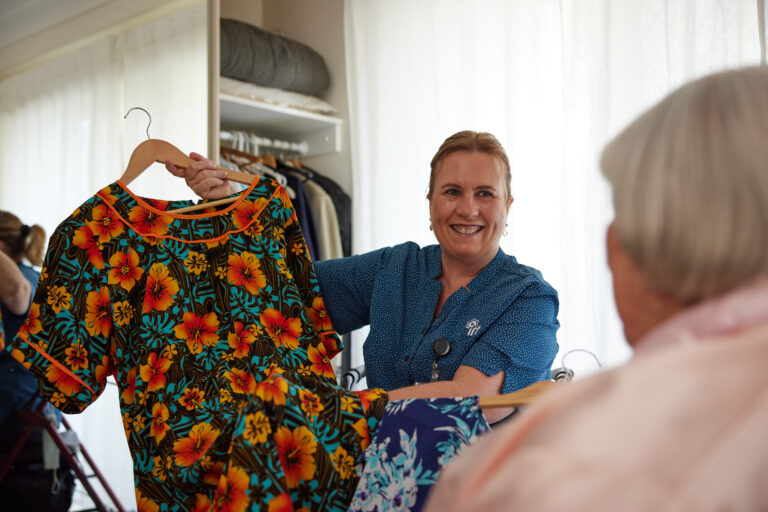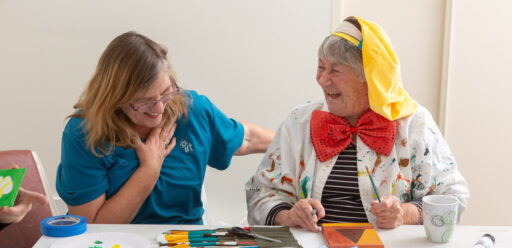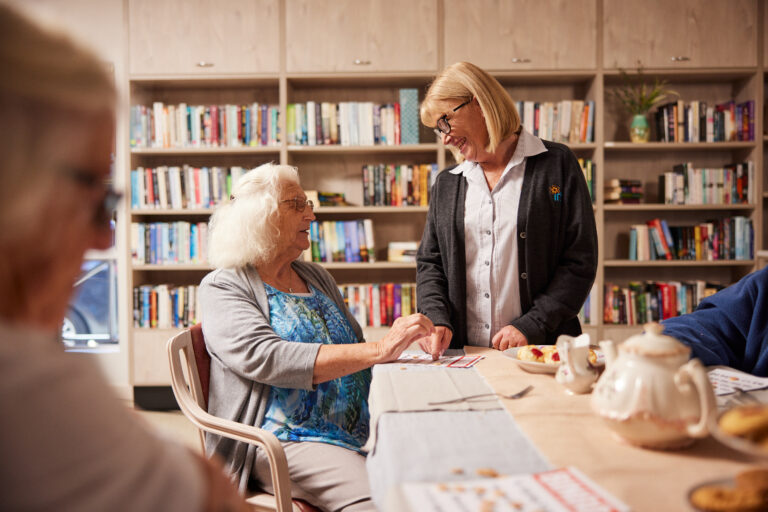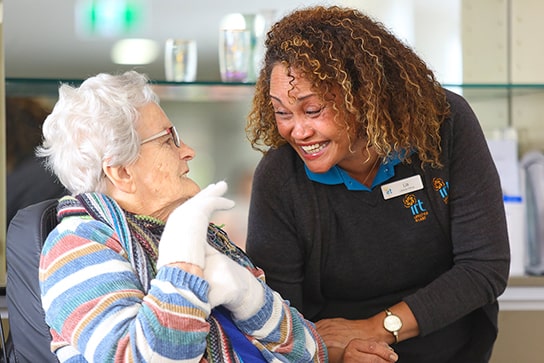How to prepare for an aged care interview (plus common questions and answers)
Succeeding at job interviews is a skill. Read tips on how to prepare for an aged care interview, plus common interview questions and answers.

It’s normal to feel nervous before a job interview – the stakes can feel very high and you don’t know exactly what to expect – and aged care jobs are no different.
Preparation, however, is the key to not only feeling confident but also ensuring your interview success, whether you’re new to working in aged care or have had many previous roles.
We spoke to one of IRT’s experienced aged care trainers and recruiters, Kate Perry (featured below, right), and asked for her advice on how to succeed at an aged care job interview. We’ve put together our top tips to help you land your next rewarding aged care role.
1. Do your research
Like any industry, having researched the organisation you’re applying to work at is essential in aged care. Kate says it’s going to come out in conversation whether you’ve actually researched the organisation online and not to underestimate the importance of knowing the organisation that you’re going to be interviewing for. Know their mission, vision and values. Know something that the organisation is doing well for their employees for example, online rewards memberships.
“I absolutely, passionately believe that the applicant needs to know the mission, vision and values of the organisation they’re going to work for because if those values don’t align with your own personal values, it’s not going to work,” she says.

2. Look for roles that are a good fit
This might seem obvious, but you’d be surprised how many aged care workers apply for roles at organisations that are a miss-match for them. Before you even get to the interview stage, make sure it’s aligned with your goals and values. It’s not just whether the organisation is going to employ you, it’s whether it’s a good fit for you as well.
“Your decision to go with a particular organisation should be based on the knowledge, values and the culture of the organisation. After you’ve researched online and attended the interview, you’ll be able to know whether or not the culture portrayed out there is alive and well or just within the structure of the interview you just been in,” Kate says.
3. Reread your resume
It can be easy to forget all the things you’ve done and achieved, so make sure you have all your previous experience fresh in your mind so you can talk about everything easily, not just your previous job. The interviewer may also ask you about certain things on your resume, especially as they relate to the job description of the role you're interviewing for.
Besides this, it can also be super helpful to work with the STAR model of answering interview questions (Situation, Task, Action, Result) so that you can clearly demonstrate how you were successful in previous roles and situations.
4. Think about what you can bring to the role
It’s important to come into an interview with a sense of not only what you’ve done in previous roles, but what you’re going to do in this new one.
“What can you contribute to the organisation? And ask the organisation what they can give to you for example; career development or progression, because working for an organisation is actually a mutual agreement,” Kate says.
5. Have a career plan
It’s about growth, so one of Kate’s questions as an interviewer would be “where do you see yourself in five years’ time?” which doesn’t necessarily mean within the organisation, but just in your career in general.
“What’s your career progression? I want to know that you’re actually invested in your career development. I want to know you have a plan in place and it’s all based on growth and professional development,” she says.

Become an aged care worker
Want to truly make a difference in the lives of older Australians? ITeC Academy is a nationally-recognised training organisation offering online and face-to-face job-ready training in aged care. Find out more and take the first step towards becoming an aged care worker.
Find out more6. Talk about your future when sharing why you want to be in aged care
If you want to stand out from other candidates, make sure you incorporate your career plan into your response about why you want to work in aged care.
The rewarding experience of looking after your grandma or grandpa may have been the catalyst or planted a seed to want to start a career in aged care, but talking about your future shows the interviewer that you have thought more about your career. This is particularly important when going for more senior positions.
“Talk about where you want to go in terms of your future, but don’t over-inflate it; be honest,” Kate says.
7. Ask questions
Prepare a couple of questions to ask the interviewer. That’s essential because it tells the interviewer that you’re interested and have invested time in researching the role you are being interviewed for and where you envisage it might take you. Ask knowledge-based questions based on the research that you’ve done on that particular organisation.
8. Show your personality
Don’t be afraid to make a joke and try and build some rapport with the interviewer. It’s so much about personality and they need to see some of that come through to determine if you have the people skills specific to the job role in terms of shared organisational values and attributes.
9. Be honest
Prepare as much as you can before the interview, but if you don’t know the answer to a question, be honest about it. Kate says that you can say “If I am honest, I don’t know the answer to that but, I tell you what, I am going to go and find out.”
Also, there’s nothing wrong with saying at the start that you’re feeling nervous.
“I’ve always said “I just need you to know that I am really nervous.”
She says it’s effective because it allows you to humanise yourself and be humble. And the interviewer will most likely reassure you and say it’s all going to be OK and it can even be a moment of rapport building.
10. Talk about your range of skills
When interviewing for aged care roles, ensure you focus on your wide range of relevant skills. Being caring, compassionate and big-hearted is naturally key, but don’t forget to talk about your practical skills and technical knowledge, in addition to your humanities skills.
“Being empathetic will still position you well, but the base knowledge of the organisation and your strategy for career progression is what’s going to stand out. You might have empathy, but managing people is not a natural thing. We want you to show us ‘this is why I am coming into the industry, these are my skills and this is where I want to be’,” Kate says.


5 common interview questions for aged care roles (and how to answer them)
To help you prepare for your interview, here are some commonly asked questions for aged care roles, plus some brief pointers on how to answer them well. These are particularly common care worker interview questions, but you can expect to be asked some of these for most roles.
1. Can you tell us a bit about yourself and why you have chosen to work in aged care?
The key with answering this is not to tell your life story, but rather to briefly explain what’s brought you to this point in your career and why you’re passionate about working in aged care. It’s a good opportunity to call out a few key roles and experiences and weave in your personal history as it pertains to the role.
Many people fail to make the most of this question, so definitely prepare for it so you can take advantage of the opportunity to show why you’re well suited to working in aged care and have the personality and skillset to match. Preparation for this question will also help you to avoid rambling!
2. What characteristics do you think are needed for those who work in aged care?
This is an opportunity for you to demonstrate that you have the personal traits that are suitable for working in aged care: warmth, compassion, empathy, a caring nature, patience, flexibility, communication skills and team work. You could give examples of how you provided personal care in a considerate way or helped comfort a distressed resident or client.
Here you could give an example of how your calm and patient demeanour helped a client or resident who was having difficulty accepting help with personal tasks.
3. Can you tell us about a stressful situation or emergency that you’ve faced and how you handled it?
When answering this, you could talk about a time you were under-staffed, a resident was badly injured or there was a disaster that involved emergency services at your aged care facility. Or, it might involve a really serious complaint from a family member. The most important thing is to show what you did (for example, using basic first aid training to ensure a resident was breathing) and how you managed to remain calm and turn the situation around and end it on a positive note.
4. What would you do if you were with a resident and they had a fall?
Falls are common and significant hazards for older people and it’s important to know how to manage them safely – both in terms of the resident’s physical and mental health. Here you could say that you would call for help immediately and then reassure the resident and try to keep them calm while you wait. This is a good opportunity to demonstrate your ability to handle a crisis, plus showcase your empathetic nature.
5. What’s person-centred care?
In 2020 the Australian aged care sector adopted a new set of quality and safety standards that were developed around the concept of ‘person-centred care’ so it’s quite likely you’ll be asked about this. Explain that person-centred care is an approach that treats each person as an individual human being with unique needs. It’s respectful and considerate of the individual preferences, needs and values of the person you are caring for and means working together to share decisions and plan appropriate care.
It’s also a good idea to give an example to show that you truly understand the concept in practice. For example, for a lifestyle officer role, it might involve providing lifestyle activities that are culturally appropriate or based on someone’s personal hobbies and interests, rather than taking a homogenous approach.

Find your perfect role with IRT
If you’re keen to work in aged care, we'd love to hear from you! IRT has been working to improve the lives of older people for more than 50 years with compassionate and personalised care. We're currently hiring for a range of positions for both experienced and entry-level aged care workers, so why not apply today?
Find my ideal jobYou may also like
Palliative care vs end of life care: what's the difference?
What is palliative care? People think palliative care is the end of someone’s life, but there’s so much more to it.
Choosing an Aged Care Centre: What to consider
Moving from your home into a residential aged care centre can be a rewarding experience for you or your loved one.


